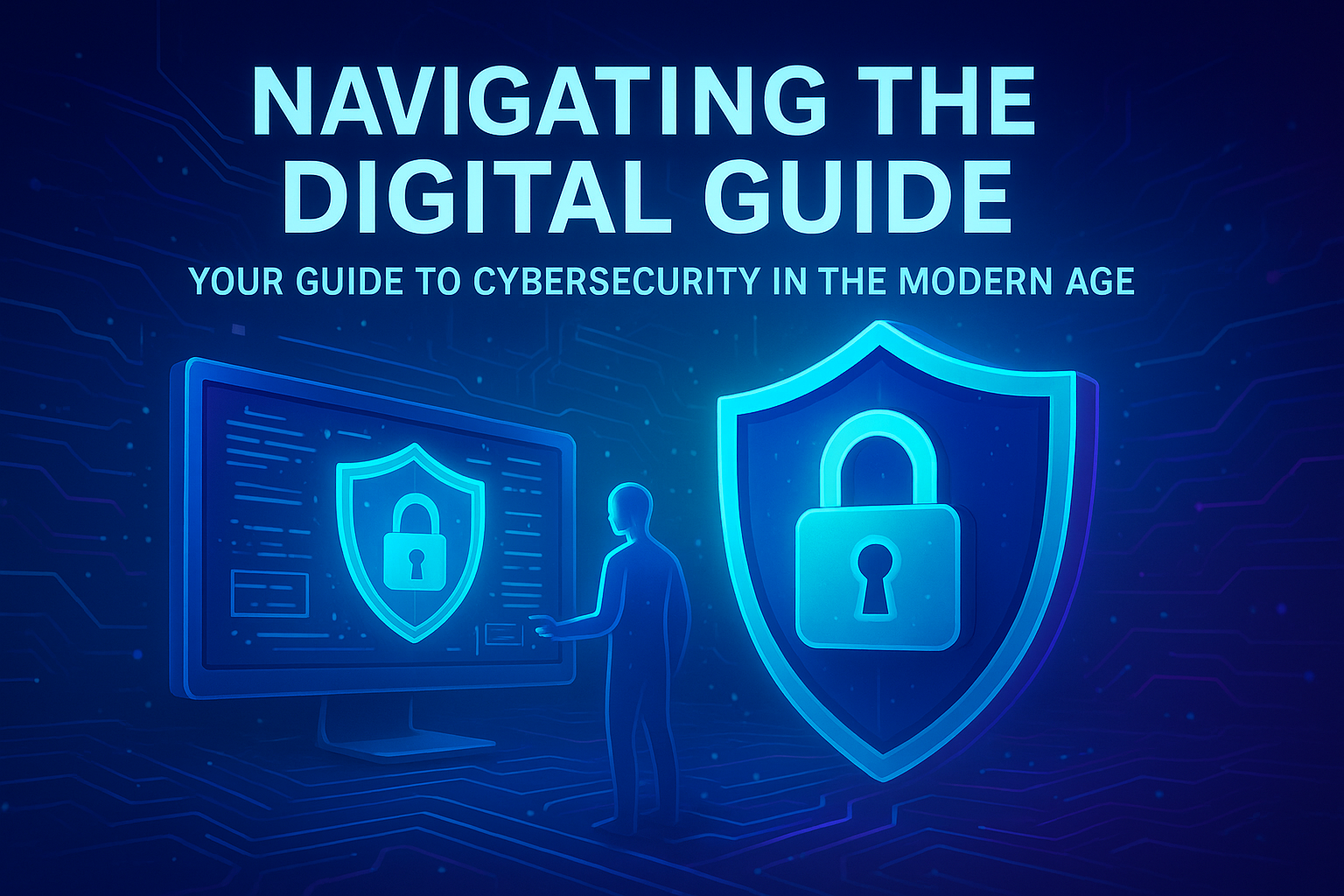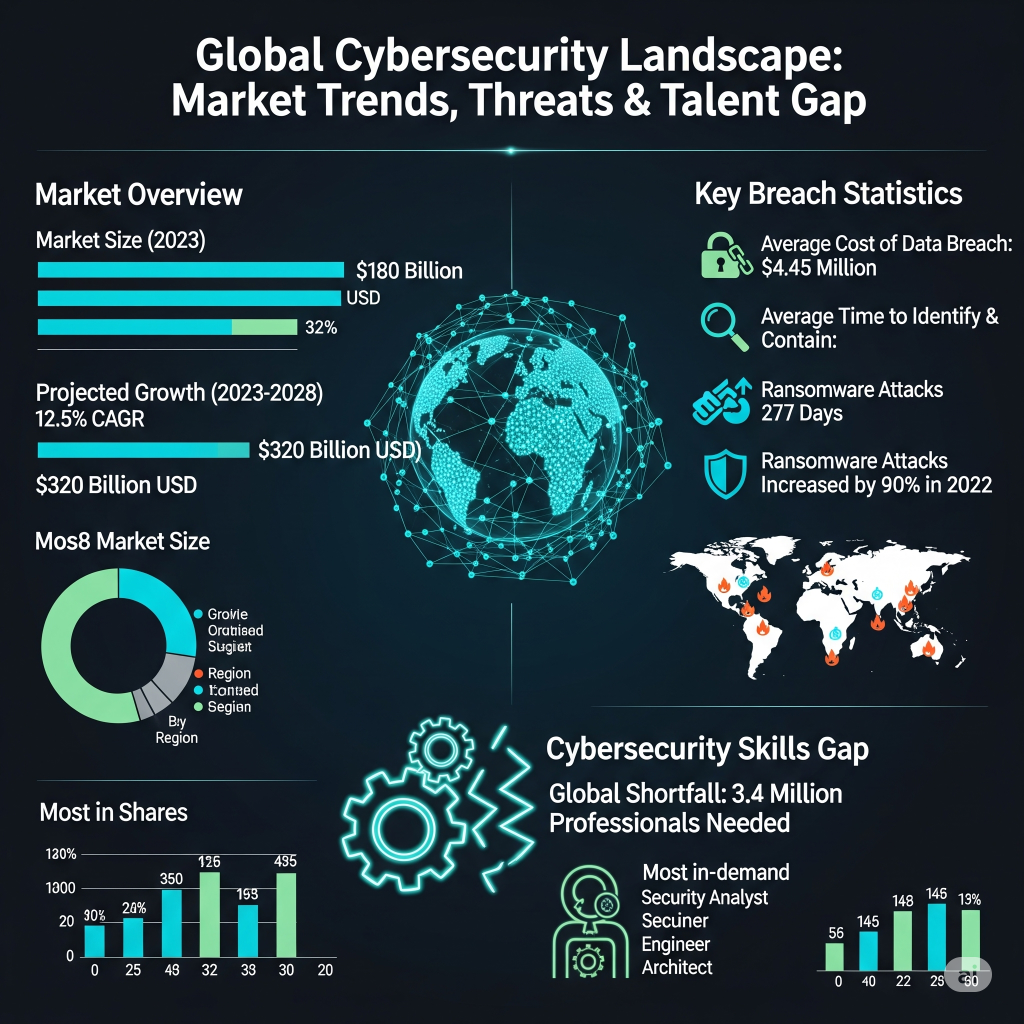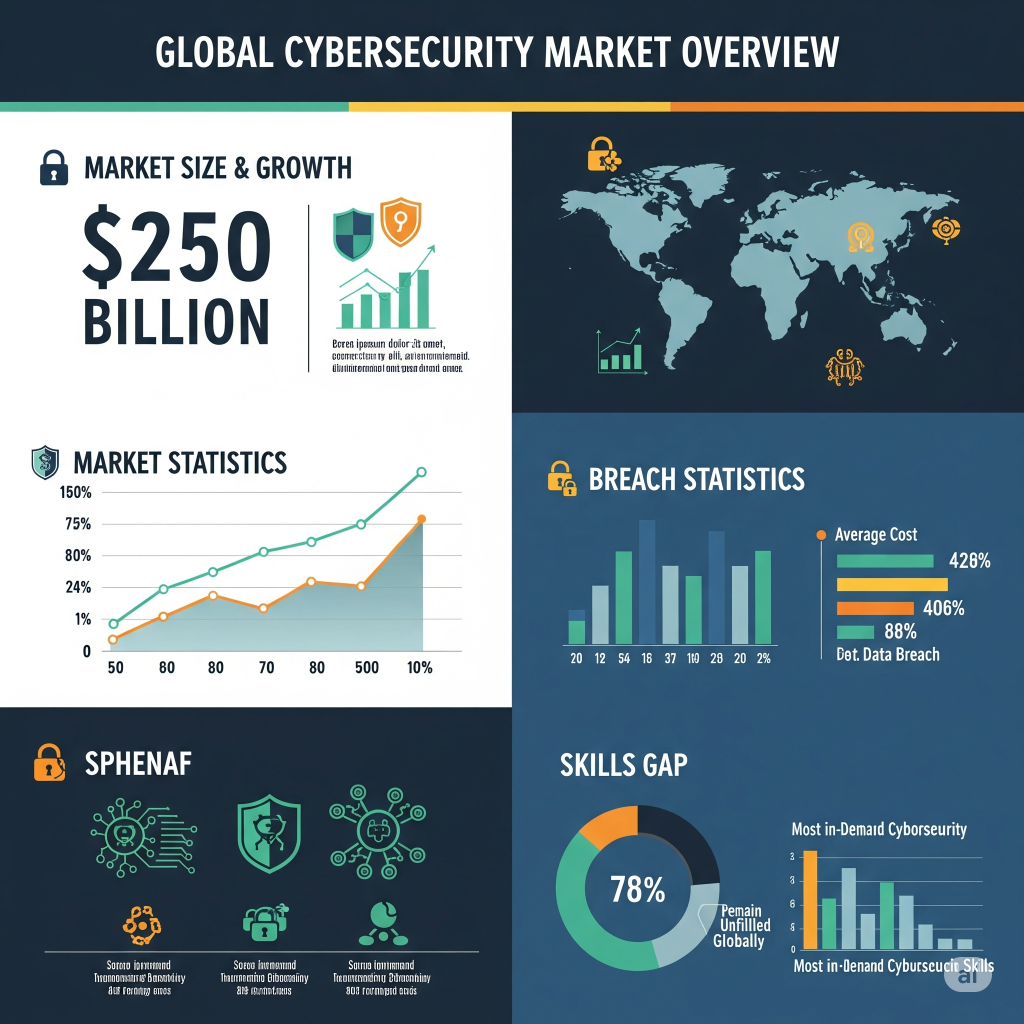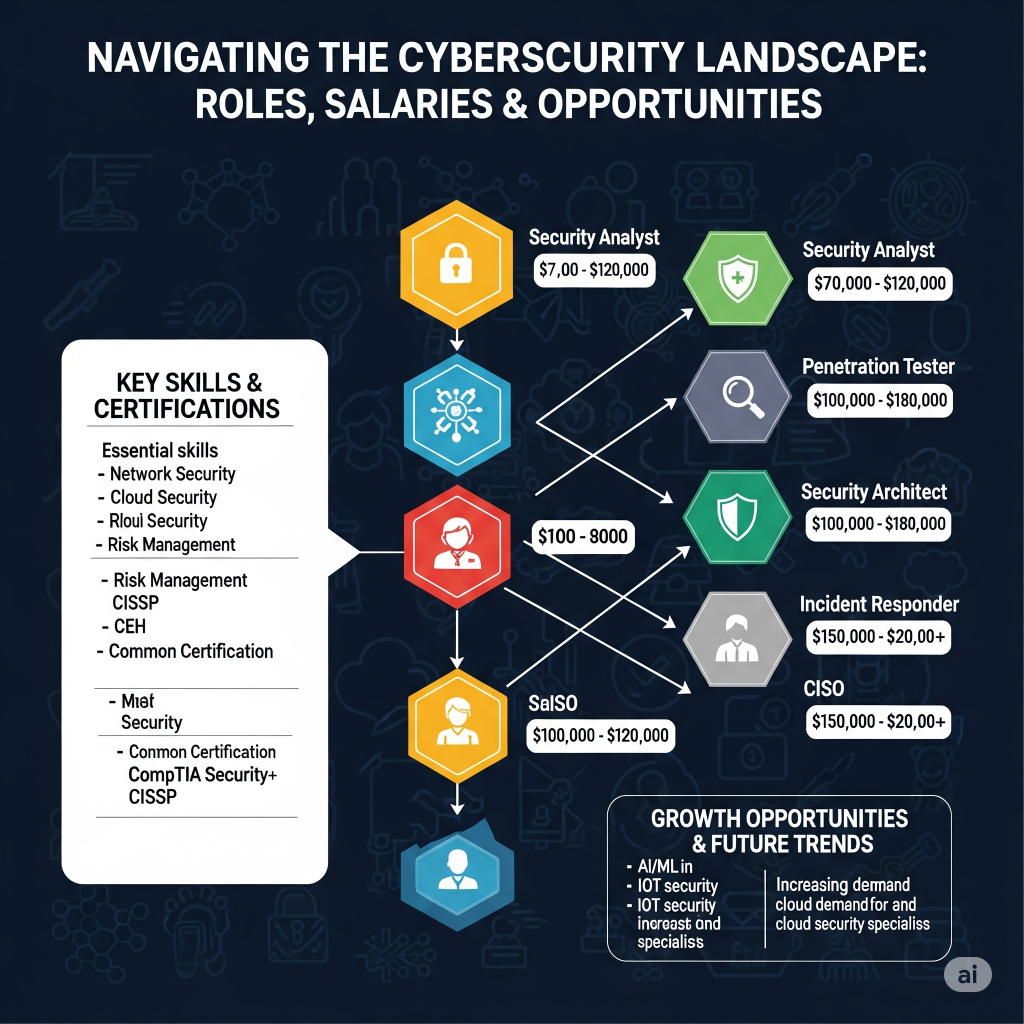Navigating the Digital Guide: Your Guide to Cybersecurity in the Modern Age

In an era defined by unprecedented digital connectivity, where data is the new gold and online interactions are the norm, cybersecurity has transcended from a niche technical field to a fundamental necessity. This comprehensive guide will illuminate the world of cybersecurity, its paramount importance, how you can embark on your learning journey, the burgeoning career landscape it offers, and the trends shaping its future.
What is Cybersecurity and Why Should You Care?
At its core, cybersecurity encompasses the practices and technologies designed to protect computer systems, networks, software, and data from unauthorized access, damage, theft, and disruption. It's about building digital fortresses around our sensitive information and ensuring the integrity and availability of our online resources.
The importance of cybersecurity cannot be overstated:
- Protecting Data: From personal information like names, addresses, and financial details to sensitive business data and intellectual property, cybersecurity measures prevent data breaches that can lead to financial losses, reputational damage, and legal liabilities.
- Securing Systems: Cybersecurity safeguards critical infrastructure, such as power grids, healthcare systems, and transportation networks, from cyberattacks that could have devastating real-world consequences.
- Preserving Online Identities: In our increasingly digital lives, our online identities are extensions of ourselves. Cybersecurity protects these identities from theft and misuse, preventing fraud and maintaining trust in online interactions.
In today's technology-driven world, cybersecurity is no longer just the responsibility of IT departments. It's a critical skill for individuals, businesses, and governments alike. Understanding cybersecurity principles empowers us to navigate the digital landscape safely and responsibly.

Your Roadmap to Learning Cybersecurity
Embarking on a cybersecurity learning journey can seem daunting, but with a structured approach, it's an achievable and rewarding pursuit. Here's how to get started:
Essential Cybersecurity Concepts:
- Network Security: Understanding how networks function and how to secure them against unauthorized access and attacks.
- Ethical Hacking: Learning to identify vulnerabilities in systems by thinking like an attacker, but with authorized permission to improve security.
- Cryptography and Encryption: Understanding the principles of encoding and decoding information to protect its confidentiality and integrity.
- Malware Analysis: Learning about different types of malicious software (viruses, worms, ransomware) and how to detect, analyze, and mitigate them.
- Web Security: Understanding common web application vulnerabilities and how to secure websites and web services.
- Data Security and Privacy: Learning best practices for protecting data throughout its lifecycle and understanding relevant privacy regulations.
Industry-Recognized Certifications:
- CompTIA Security+: A foundational certification validating essential cybersecurity skills.
- Certified Ethical Hacker (CEH): Focuses on offensive security techniques and ethical hacking methodologies.
- Certified Information Systems Security Professional (CISSP): A globally recognized certification for experienced security professionals.
- GIAC (Global Information Assurance Certification): Offers specialized certifications in various cybersecurity domains.
Hands-on Tools and Practice:
- Virtualization Software (e.g., VirtualBox, VMware): Allows you to create isolated environments for safe experimentation.
- Linux Operating Systems (e.g., Kali Linux, Ubuntu): Commonly used in cybersecurity for their command-line tools and flexibility.
- Network Scanning Tools (e.g., Nmap): Used for discovering devices and services on a network.
- Vulnerability Scanning Tools (e.g., Nessus, OpenVAS): Help identify security weaknesses in systems.
- Packet Analysis Tools (e.g., Wireshark): Used for capturing and analyzing network traffic.
Community Resources:
- Online Forums (e.g., Reddit's r/cybersecurity, r/netsec): Connect with other learners and professionals, ask questions, and share knowledge.
- Meetup Groups and Conferences: Network with local cybersecurity professionals and stay updated on industry trends.
- Open Source Projects: Contribute to cybersecurity-related open-source projects to gain practical experience.
Personal and Career Transformations:
Gaining cybersecurity skills can lead to significant personal and professional growth. Personally, you'll become more aware of online threats and better equipped to protect your digital life. Professionally, you'll open doors to a high-demand field with diverse and rewarding career opportunities.
The Exponential Growth of the Cybersecurity Field

The cybersecurity landscape is experiencing rapid growth, fueled by the increasing sophistication of cyber threats and the growing reliance on digital technologies. Credible studies and industry reports highlight this trend:
- The global cybersecurity market is projected to reach trillions of dollars in the coming years, with consistent double-digit growth rates (various sources like Gartner, Statista).
- Breach statistics continue to rise, with the average cost of a data breach reaching millions of dollars, further emphasizing the need for robust security measures (IBM Cost of a Data Breach Report).
- There is a significant global cybersecurity skills gap, with millions of unfilled positions, indicating a high demand for qualified professionals (Cybersecurity Ventures).
This growth presents a wealth of opportunities for individuals looking to enter or advance in the cybersecurity field.
Lucrative Career Opportunities in Cybersecurity
The cybersecurity domain offers a diverse range of in-demand job roles, catering to various interests and skill sets. Here are a few prominent examples, along with potential global vacancy insights and salary ranges (data may vary based on location, experience, and specific job requirements; consult reputable job portals like LinkedIn, Indeed, Glassdoor, and labor market reports for the most up-to-date information):
- Security Analyst: Monitors systems and networks for security incidents, analyzes threats, and implements security measures. Global vacancies are consistently high, with entry-level salary ranges often starting from $50,000 - $80,000 USD annually and increasing with experience.
- Penetration Tester (Ethical Hacker): Conducts simulated cyberattacks to identify vulnerabilities in systems and networks. Demand is strong, with salary ranges typically between $70,000 - $120,000+ USD annually.
- SOC (Security Operations Center) Engineer: Designs, implements, and manages security tools and technologies within a SOC environment. High demand exists, with salary ranges often falling within $65,000 - $110,000+ USD annually.
- Cloud Security Specialist: Focuses on securing cloud computing environments and data. With the widespread adoption of cloud services, this role is in high demand, with salary ranges often starting from $80,000 - $130,000+ USD annually.
- Cybersecurity Manager/Architect: Develops and oversees an organization's overall cybersecurity strategy and architecture. These roles typically require significant experience and command higher salaries, often ranging from $120,000 - $200,000+ USD annually.
These are just a few examples of the many exciting career paths available in cybersecurity. As the field continues to evolve, new specializations and roles will undoubtedly emerge.

The Future of Cybersecurity: Emerging Trends
The cybersecurity landscape is constantly evolving in response to new threats and technological advancements. Here are some key trends shaping the future of the field:
- Artificial Intelligence (AI) and Machine Learning (ML) in Security: AI and ML are being increasingly used to enhance threat detection, automate security tasks, and improve incident response. Conversely, AI is also being leveraged by attackers, creating an ongoing arms race.
- Zero-Trust Architecture: A security model based on the principle of "never trust, always verify," regardless of whether users or devices are inside or outside the organization's network perimeter. This approach is gaining traction as traditional perimeter-based security proves insufficient.
- Quantum-Proof Encryption: With the potential advent of quantum computing, current encryption methods could become vulnerable. Research and development into quantum-resistant cryptography are crucial for long-term data security.
- Increased Focus on Privacy and Data Protection: Regulations like GDPR and CCPA are driving organizations to prioritize data privacy and security, leading to a greater demand for professionals with expertise in these areas.
- The Convergence of Physical and Cyber Security: As more physical devices become connected to the internet (IoT), the lines between physical and cyber security are blurring, requiring a more holistic approach to security.
Staying Relevant and Competitive: Actionable Tips
To thrive in this dynamic field, continuous learning and adaptation are essential. Here are some actionable tips:
- Stay Updated: Follow industry news, blogs, and research reports to stay informed about the latest threats and trends.
- Continuous Learning: Pursue certifications, take advanced courses, and experiment with new tools and technologies.
- Network Actively: Engage with the cybersecurity community through online forums, meetups, and conferences.
- Develop Soft Skills: Communication, problem-solving, and critical thinking are crucial for effective cybersecurity professionals.
- Build a Portfolio: Showcase your skills through personal projects, contributions to open-source projects, or participation in capture-the-flag (CTF) competitions.
How SkillEcted’s Cybersecurity Career Program Boosts Your Career
SkillEcted’s Cybersecurity Career Program takes you from beginner to job-ready professional through 10 structured phases—covering networking, Linux/Kali Linux, penetration testing, threat detection, digital forensics, and real-world projects.
You’ll master key tools like Wireshark, Nmap, Burp Suite, Metasploit, and gain soft skills, interview training, and live mentorship.
Link to join course
Conclusion: Secure Your Future in the Digital World
Cybersecurity is not just a career path; it's a vital field that underpins our increasingly digital world. By understanding its importance, embracing continuous learning, and staying abreast of emerging trends, you can not only protect yourself and your organizations but also embark on a rewarding and impactful career journey. The digital fortress needs dedicated guardians, and the opportunities for skilled cybersecurity professionals are vast and continue to grow. Start your journey today and become a vital part of securing our collective digital future.








